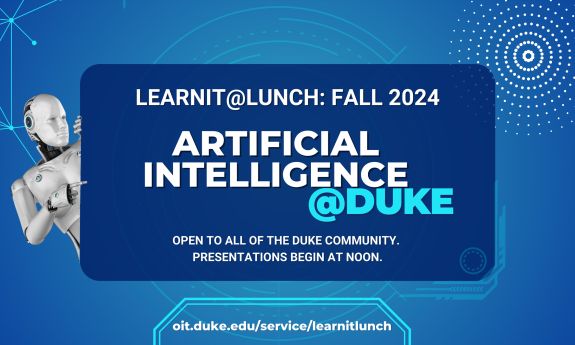Learn How To Harness Artificial Intelligence during LearnIT@Lunch Series
This fall, the focus is on AI, and how to harness the technology in every day work and life

“AI is the new hot topic, and we are eager to capture the Duke community's interest and provide information on how to use these tools safely, responsibly, and ethically, essentially creating an AI-literate community,” said Trina Rodriguez, OIT’s Education and Training Practitioner. “This is your chance to learn directly from Duke experts and tap into professional development resources. You can catch a single session or attend them all.”
The full list of sessions is below, and updated class descriptions can be found here. Registration is not required.
Sept. 11
Mind meets machine: Using ChatGPT-4 in the real world
Zoom Link: https://duke.is/c/vqry
Join Steve Toback, OIT’s Media Architect and Senior Producer for Academic Media Production, to discover how AI is transforming the workplace in "Practical Applications of AI: Mind Meets Machine: Using ChatGPT4o In The Real World." This talk will explore how to leverage ChatGPT4o to enhance daily office tasks, from summarizing complex data to providing real-time technical support — all while ensuring data security. Learn practical, actionable strategies to seamlessly integrate AI into your workflow.
Sept. 25
Copilot to Autopilot: Beginner’s Guide to Microsoft Copilot
Zoom Link: https://duke.is/b/dcj8
Join Alpha Esser in "Getting Cozy with AI: Beginners Guide to Microsoft Copilot." The course is designed for anyone who wants to learn how to use Bing’s Copilot (powered by OpenAI's GPT-4). This powerful and creative chat assistant can help you with various tasks while protecting the data and business interests of Duke University. In this workshop, you will learn how to interact with Copilot, how to ask for information, generate content using prompts, and receive tips to make the most of Copilot’s features and capabilities
Oct. 9
Beyond Algorithms: Bridging Technology and Everyday Needs
Zoom Link: https://duke.is/n/kpu8
Join Felipe Polo-Wood on an insightful journey into the world of AI and Large Language Models (LLMs), where technology meets real-world applications. In "Beyond Algorithms: Bridging Technology and Everyday Needs," explore how cutting-edge AI solutions are being developed and used to address practical challenges — from simplifying daily tasks and enhancing personal projects to transforming education and digital experiences. Discover the paradigm shifts from traditional computing to generative AI, learn when to leverage these powerful tools, and see how advanced technology can be harnessed for everyday use. This talk is perfect for anyone curious about the real impact of AI on our lives and eager to discover the creative potential of these technologies in action.
Oct. 23
Balancing Ethics with AI
Zoom Link: https://duke.is/b/ffkz
Join Robert Duvall
Description to follow.
Nov. 6
Medicine and AI: Innovative Ways to use AI in Health care
Zoom Link: https://duke.is/4/gcpg
Join Shelley Rusincovitch
Description to follow.
Nov. 20
AI Fraud: Detection and Prevention Strategies
Zoom Link: https://duke.is/4/2p7c
Join Gaylynn Fassler
Description to follow.
Dec. 4
The Power of AI Language Models in Unstructured Data
Zoom Link: https://duke.is/5/p2ew
Join Mark McCahill as he describes how advances in AI language models are making it feasible to search, summarize and extract meaningful information from unstructured / semi-structured text and documents. New AI capabilities can augment how we handle and process information that does not fit well into tabular formats like spreadsheets or relational databases – for example, grant proposals, textbooks, scientific publications, etc.
This presentation will cover how Semantic Search, Knowledge Graphs, and Retrieval Augmented Generation (RAG) technology can extend the capabilities of Large Language Models (LLMs) such as ChatGPT by reducing LLM's tendency to "hallucinate" incorrect information. The session will also discuss some potential applications of these AI technologies at Duke.
Send story ideas, shout-outs and photographs through our story idea form or write working@duke.edu.
Follow Working@Duke on X (Twitter), Facebook and Instagram and subscribe on YouTube.